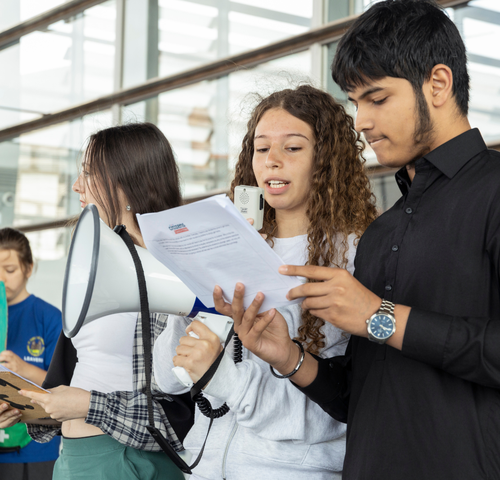Unlocking British Muslim Potential Is Long Overdue !

Qari Asim, MBE, Chief Imam at the Makkah Mosque in Leeds, West Yorkshire, gives his thoughts on the CUK commissioned report, The Missing Muslims, published this week.
"The “Missing Muslims” report ( pdf here ) commissioned by Citizens UK, was released this week. The report follows an 18-month Commission that listened to a wide range of voices including institutions, local authorities and members of the public. The report is a valuable addition to the literature about Muslims - recognising the huge contribution of Muslims, evaluating the challenges and avoiding the trap of conflating religion and ethnicity.
The report contains 18 recommendations divided into three categories: recommendations for government and local authorities, for civil society and the business sector and for British Muslim communities. The recommendations are practical and inexpensive to implement.
This report is not seeking ‘special treatment’ for British Muslims, rather it is an ambitious and timely attempt to find ways of encouraging full and active participation in public life for all communities . The report argues that rather than marginalising the Muslim communities, the society needs to recognise that unlocking a fuller Muslim presence in and contribution to British public life could help to reduce perceptions of increasing polarisation within British society.
There are three recommendations of the report that really stand out for me.
First , the government needs to adopt a workable definition of anti-Muslim prejudice and legislate against it. Following the atrocities at Manchester Arena and London Bridge, attacks against Muslims went up fivefold, and last week there have been reports of a number of acid attacks on Muslims. Muslim have been assaulted, even children called "terrorist", "bomber" on school playgrounds and petrol bombs have been thrown at mosques. Anti-Muslim hatred is a notable obstacle to integration and participation in public life.
The 2016 hate-crime action plan, set out by the government, and the recent assurances by the Home Secretary that British Muslims will be protected are important steps but there is still a difference in how, as a society, we talk about attacks on Muslims, as opposed to attacks on other ethnic or religious minorities.
It is therefore more important than ever that zero-tolerance is shown towards anti-Muslim hatred by making it illegal. I am aware of the complexities involved in legislating against anti-Muslim hatred because unlike Jews and Sikhs, Muslims are not one race. However, a working definition of anti-Muslim prejudice could be informed by the definition of anti-semitism adopted by the government in 2016. Legislation will only achieve some success but establishing a working definition will act as deterrent to bigots. We need to change civic attitudes towards Muslims through education.
Second important recommendation is for the Government to develop an integration strategy. There seems to be significant scepticism across British society about the integration, and even the shared allegiance, of fellow Brits. This has resulted, at times, Muslims not sharing equal status or access to equal opportunities within the UK. The government must help to identify and break down the barriers to equal opportunity. Of course, integration cannot solely be achieved by governments' actions. We all need to pay attention to the places where our society looks more fragmented. No community should become segregated or cut-off – whether that’s because of a lack of contact with people from other backgrounds, or not speaking fluent English, or because some people don’t want them to be part of our shared society.
The report acknowledges that integration is a two-way street, which, if it is to be achieved, requires both British Muslims and other ethnic groups, including the majority white British population, to find ways of engaging across ethnic lines. Following Louise Casey Review last year, it is hoped that the an integration strategy, the government is currently formulating, will set out the positive role that the state can and should play in achieving social and economic integration.
It goes without saying that protection from anti-Muslim prejudice and greater integration requires meaningful engagement between the state and parts of the Muslim community, including those with whom the government may disagree. Both parties need to be proactively address the 'broken relationship' to develop a more united, cohesive and stronger nation.
Third , the cluster of recommendations made to the British Muslim communities focus on Muslims investing in their mosques and Imams, capacity building and improving the governance of their institutions. The recommendation for Muslim umbrella bodies to introduce voluntary standards for mosques and Islamic centres is very welcome, although enforcement of such standards on members is going to provide extremely difficult. Stronger safeguards, better governance and more access for women to these institutions is long overdue. It is hard to disagree with the recommendation that mosques must invest in British-born Imams, pay them decent living wage and equip them with pastoral skills so they are able to deal with the challenges facing British Muslims. The sermon in the mosques must be in English. English language is a common denominator and a strong enabler for young people to understand the rich tradition of their faith and be proud of their British Muslim identity.
It must be noted that lack of investment in religious institutions and faith leaders, and adopting of voluntary standards or English language in sermons are not challenges unique to Muslims, other faith minorities are also lagging behind in this regard. There needs to be consistency when seeking change amongst minority groups.
Young British Muslims, like the rest of young people - must feel that Britain is their home, in which they do not have to fear an anti-Muslim attack, where they have an equal stake and the same chances as everyone else in our shared society. The report argues that rather than marginalising the Muslim communities, society needs to recognise that unlocking a fuller Muslim presence in and contribution to British public life, could help to reduce perceptions of increasing polarisation within British society.
The success of the report will be judged by effective implementation of the recommendations but there is no doubt that a change in attitudes is needed to unlock the potential of "missing Muslims" from public life."





